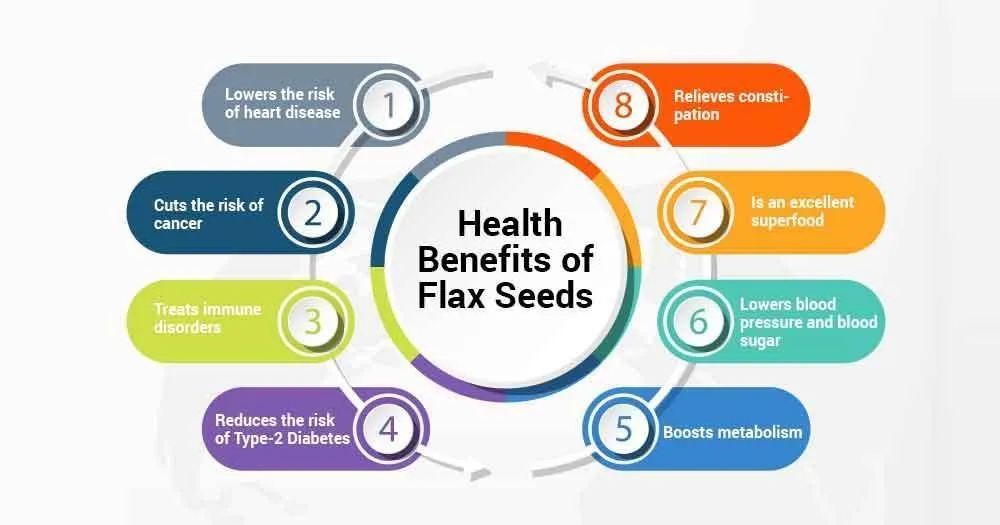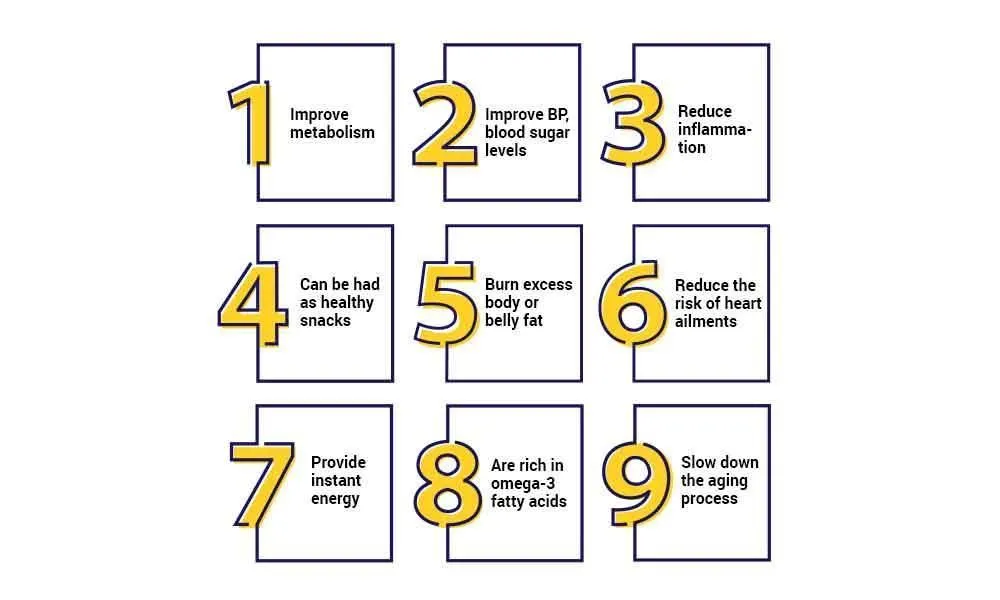Flaxseed (also known as linseed) is a fiber crop that is grown in cooler regions of the world. It contains a wide array of nutrients that are considered excellent for humans. Out of all, the two main nutrients that contribute to weight loss are:
Omega-3: These are the essential fatty acids (good fats)
Fiber: It contains both the soluble and insoluble types of fiber.
These two nutrients have immense benefits for the human body, and regular consumption of flax seeds can help you have higher immunity. These seeds have boosted antimicrobial properties and can also help you in weight management through a reduction in hunger.
Here is the nutrition table for flax seeds:
Flaxseed
Nutritional value per 100 g (3.5 oz.)
Energy |
2,234 kJ (534 kcal) |
|
Carbohydrates |
28.88g |
|
Sugars |
1.55g |
|
Dietary fiber |
27.3g |
|
Fat |
42.16g |
|
Saturated |
3.663g |
|
Monounsaturated |
7.527g |
|
Polyunsaturated |
28.730g |
|
omega-3 |
22.8g |
|
omega-6 |
5.9g |
|
Protein |
18.29g |
|
Vitamins |
Quantity |
%DV |
Thiamine (B1) |
1.644mg |
143% |
Riboflavin (B2) |
0.161mg |
13% |
Niacin (B3) |
3.08mg |
21% |
Pantothenic acid (B5) |
0.985mg |
20% |
Vitamin B6 |
0.473mg |
36% |
Folate (B9) |
87μg |
22% |
Vitamin C |
0.6mg |
1% |
Minerals |
Quantity |
%DV |
Calcium |
255mg |
26% |
Iron |
5.73mg |
44% |
Magnesium |
392mg |
110% |
Phosphorus |
642mg |
92% |
Potassium |
813mg |
17% |
Zinc |
4.34mg |
46% |
The above values are taken from Wikipedia and are verified by USDA.
Omega-3 fatty acids should be an important part of everyone’s diet for the above reasons. It is an unsaturated (or good fat) that keeps you full and satiated for longer. It also boosts your metabolism by breaking down carbohydrates and proteins, and also strengthens your nervous system.
The only trouble is that omega-3 fatty acids cannot be derived adequately from the normal diet. The only way to include them in our diet is through supplements. This is just where flax seeds come in because they make it easy for our bodies to get the required nutrition.
Did you know? Being an unsaturated fat, it reduces bad cholesterol (LDL) and increases good cholesterol (HDL), thus cutting down the risk of several heart ailments. It also helps you lose weight linearly.
The fiber in any form is very good for our body since our body needs time to process it, thus keeping you full and satiated for a longer duration. Linseeds contain both soluble and insoluble fiber in high quantities. This helps in keeping our digestive system working efficiently and this is why eating foods high in fiber is recommended.
While soluble fiber plays an important role in lowering the blood cholesterol levels, insoluble fiber helps in moving the stool through the colon more quickly, thus helping in bowel movements. Flax seeds are extremely low in both carbs and calories which further helps in controlling diabetes and weight loss.
These super seeds help with weight loss and have several other health benefits too:
Lowers the risk of heart disease
Cuts the risk of cancer
Treats immune disorders
Reduces the risk of Type-2 Diabetes
Relieves constipation
Is an excellent superfood
Lowers blood pressure and blood sugar
Boosts metabolism
Following are some of the simple ways to make flax seeds or linseeds a part of your daily food:
In salads, soups, and sandwiches
Muffins
Added to yogurt
Mixed with oatmeal smoothies
Added to protein shakes
Marinating chicken
As a substitute for flour in baking recipes
People are unaware of the exact origin of this vegetable, though it’s logical to assume that it originated in Belgium. As part of the cruciferous vegetable family, Brussels sprouts share a close relation to broccoli, kale, cabbage, and cauliflower.
Did you know? If you are looking for a related seed-based diet, you can consider chia seeds for their proteins, omega 3s, fibers, calcium, magnesium, and manganese content- and they taste just as delicious.
As healthy as flax seeds may seem to be, they may also come with some side effects or health risks, as follows:
Indigestion
Bloating and stomach cramps
Diarrhea
Vomiting
Inflammatory Bowel Disease
Low blood pressure
Internal bleeding
May contains toxins
Brussels sprouts, raw
(edible parts)
Nutritional value per 100 g (3.5 oz.)
Energy |
179 kJ (43 kcal) |
|
Carbohydrates |
8.95 g |
|
Sugars |
2.2g |
|
Dietary fiber |
3.8g |
|
Fat |
0.3g |
|
Protein |
3.48g |
|
Vitamins |
Quantity |
%DV |
Vitamin A equiv. |
38μg |
5% |
beta-Carotene |
450μg |
4% |
lutein zeaxanthin |
1590μg |
|
Thiamine (B1) |
0.139mg |
12% |
Riboflavin (B2) |
0.09mg |
8% |
Niacin (B3) |
0.745mg |
5% |
Pantothenic acid (B5) |
0.309mg |
6% |
Vitamin B6 |
0.219mg |
17% |
Folate (B9) |
61μg |
15% |
Choline |
19.1mg |
4% |
Vitamin C |
85mg |
102% |
Vitamin E |
0.88mg |
6% |
Vitamin K |
177μg |
169% |
Minerals |
Quantity |
%DV |
Calcium |
42mg |
4% |
Iron |
1.4mg |
11% |
Magnesium |
23mg |
6% |
Manganese |
0.337mg |
16% |
Phosphorus |
69mg |
10% |
Potassium |
389mg |
8% |
Sodium |
25mg |
2% |
Zinc |
0.42mg |
4% |
Other constituents |
Quantity |
|
Water |
86g |
|
approx. 5-10 sprouts per 100 g |
The above values are taken from Wikipedia and are verified by USDA.
Did you know?
Brussels sprouts have more vitamin C than oranges
They are loaded with vitamin A, folacin, potassium, and calcium.
They have almost twice the vitamin K that is found in red cabbage.
They contain 3-5 grams of fiber per cup.
They have more glucosinolates than any other common crucifer.
They are extremely rich in protein.
Here are some of the most commonly known health benefits of Brussel sprouts:
Improve metabolism
Improve BP, blood sugar levels
Reduce inflammation
Can be had as healthy snacks
Burn excess body or belly fat
Reduce the risk of heart ailments
Provide instant energy
Are rich in omega-3 fatty acids
Slow down the aging process
The benefits of Brussels sprouts are not only limited to their nutritional richness, but they expand further to weight loss as well. Brussels sprouts are very low in calories (1 oz. of cooked and drained Brussels sprouts weigh in at about 10 calories), and they contain only trace amounts of fat.
The high content of vitamin C in it reduces body and belly fat, and is aptly regarded as one of the best food remedies for cellulite. They contain a natural compound called indole-3-carbinol (I3C). It is a precursor to diindolylmethane (DIM) that helps certain liver enzymes to block the production of 16-OH estrogens.
DIM also helps remove harmful substances to keep your skin strong and fresh. The high content of vitamin C acts as a real anti-cellulite nutrient, which fights those unsightly bumps and lumps by promoting collagen synthesis and by scavenging free radicals.
You may roast them in olive oil or sauté them with no-sodium broth and minced garlic
You may some fresh herbs like rosemary or basil to sprouts
You may eat them raw by adding them to your favorite salads
You may also steam them and have them
You may use them as a salad dressing
Here are some smart ways that you can use to include Brussels sprouts in your daily diet:
May cause indigestion and nausea
They taste bitter
May swell up thyroid glands
May reduce blood clotting
May cause infection
Here are some of the most common side effects of consuming Brussels sprouts:
Did you know? There are 56 calories in 1 cup of cooked or roasted Brussels sprouts.
Moringa is a healthy food source found in Africa and Asia. It is called munakkai, murungai, or moringa in regional South Indian languages. It contains 13 species from tropical and subtropical climates that range in size from tiny herbs to massive trees.
Every part of the moringa tree is edible, especially the leaves. They are the most nutritious and they make up for the plant’s low-fat and high-nutrient qualities. These leaves are rich in vitamins B-1, B-2, and B-3 that convert food into energy.
This amazing tree is believed to be native to the Indian and Himalayan mountains. It is typically 25 feet high in its native regions and may grow to 10 feet or higher in locations where it is cultivated for food or medicines.
The leaves of this tree are deep green, with long, edible oval leaflets. The moringa tree flowers and produces long, bean-like, edible pods.
Moringa leaves are a powerhouse of nutrition, vitamins, proteins, and minerals, and that too without any fat and calories. Here is what you should expect from 100 gm of moringa seeds:
Moringa oleiferaleaf, raw
Nutritional value per 100 g (3.5 oz.)
Energy |
64 kcal (270 kJ) |
|
Carbohydrates |
8.28g |
|
Dietary fiber |
2.0g |
|
Fat |
1.40g |
|
Protein |
9.40g |
|
Vitamins |
Quantity |
%DV |
Vitamin A equiv. |
378μg |
0.47 |
Thiamine (B1) |
0.257mg |
0.22 |
Riboflavin (B2) |
0.660mg |
0.55 |
Niacin (B3) |
2.220mg |
0.15 |
Pantothenic acid (B5) |
2.220mg |
0.03 |
Vitamin B6 |
1.200mg |
0.92 |
Folate (B9) |
40μg |
0.1 |
Vitamin C |
51.7mg |
0.62 |
Minerals |
Quantity |
%DV |
Calcium |
185mg |
0.19 |
Iron |
4.00mg |
0.31 |
Magnesium |
147mg |
0.41 |
Manganese |
0.36mg |
0.17 |
Phosphorus |
112mg |
0.16 |
Potassium |
337mg |
0.07 |
Sodium |
9 mg |
0.06 |
Zinc |
0.6 mg |
|
Other constituents |
Quantity |
|
Water |
78.66g |
The above values are taken from Wikipedia and are verified by USDA.
Moringa leaves indeed play an important role in the weight loss process. These leaves are low in fat and high in nutrients, thus making them a healthy alternative to high-calorie foods.
Here are some nutritional facts about moringa:
1 oz. of moringa has more potassium than 1 oz. of banana
1 oz. of these leaves has more iron than 1 oz. spinach
1 oz. of its leaves has more vitamin A than 1 oz. of carrots
Moringa leaves contain as much protein as do milk and eggs
Did you know? You may get 42% of the recommended daily minimum requirement of proteins and 125% of the recommended daily minimum requirement of calcium from its leaves alone!
The leaves can be either consumed raw, cooked or boiled. They are very high in all variants of vitamin Bs, which boosts up the digestion process and also speeds up the process to convert foods to energy thus improving metabolism.
We would also recommend you to rely on Foods That Fight Fat and Support Weight Loss. You can also get in touch with your nutritionist to know more about some easy exercises that you can do every day to boost your gut health.
There are many ways in which you can conveniently consume these leaves. Some of the common and most simple ways are:-
Raw as salad
Added to cooked vegetables and soups
Boiled like green tea leaves
Dry powder
Supplement tablets
We welcome you to try these amazing moringa leaves as a part of your daily routine to boost up your weight loss process. You can choose the way you want to consume them at your convenience since it beholds the same nutrition and health benefits in all ways!
Here are the side-effects of eating moringa in excess or appropriately:
Irregular blood pressure
May cause contraction of the uterus
Reduce fertility
May reduce heart rate
Can affect thyroid glands
May not be taken in pregnancy
Ask a dietitian online about an ideal diet
At MevoLife, it is our constant endeavor to offer you the best advice on our blog. After listing the health benefits of flaxseeds, Brussels sprouts, and moringa seeds in your daily diet, we would like to underscore the importance of consulting a qualified dietitian or wellness expert for your daily diet.
You can get into an online consultation with an expert of your choice from any part of the world, no matter where you are and what time of the day it is. These sessions come without reservations, and with no waiting times. All you would need to get going with your first session is your smartphone, internet connectivity, and a valid MevoLife account!



